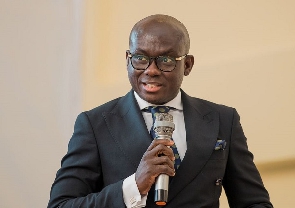 Attorney-General, Godfred Yeboah Dame
Attorney-General, Godfred Yeboah Dame
Attorney-General, Godfred Yeboah Dame, then deputy, noted in 2020 that in order to alleviate the high economic and financial crimes across borders in Africa, the canker must be dealt with all seriousness.
Speaking during his keynote address at the 2nd Attorney General Alliance-Africa (AGA-Africa) Africa Partnership for Justice Annual Conference he noted that although modern slavery, drug trafficking are on the top list of criminal activities in the region, "financial crimes – corruption and its related offences – money laundering and illicit financial flows constitute the most serious and urgent transnational offences Africa is faced with."
The Attorney-General also noted that corruption thrives when enabling conditions are conducive to its concealment, and where there is an absence of appropriate punitive measures to serve as deterrents.
Read the full story originally published on March 9, 2020 by thebftonline.com
Economic and financial crimes represent the worst kind of offences faced within individual countries as well as across national borders in Africa, and they must be tackled with the seriousness they deserve, Deputy Attorney-General for the Republic, Godfred Yeboah Dame, has said.
“I know many conceive human trafficking, modern day slavery, drug and arms trafficking and cybercrime as the biggest problems in terms of transnational crimes in Africa. However, for me, the financial crimes – corruption and its related offences – money laundering and illicit financial flows constitute the most serious and urgent transnational offences Africa is faced with.
“Corruption has a deleterious effect on fundamental human rights, aggravates the poverty of the people and erodes public trust in governments. Corruption results in misallocation of resources and creates distortions in society,” he stated.
He made this known during his keynote address at the 2nd Attorney General Alliance-Africa (AGA-Africa) Africa Partnership for Justice Annual Conference.
Mr. Dame indicated that corruption thrives when enabling conditions are conducive to its concealment, and where there is an absence of appropriate punitive measures to serve as deterrents.
“The adherence to a uniform regime in legislation and ensuring that domestic legislation is responsive to the ever-changing face of transnational crime; ratification of international conventions aimed at fighting the menace of transitional crime; deeper cooperation between state parties’ crime fighting agencies; and the adoption of unified vision and approach are some of the practical initiatives to be taken by African states in dealing with the spectre of transnational crime in Africa. As the saying goes, ‘in unity lies our strength’.”
The two-day conference, which came off at the Kempinski Hotel in Accra, was held under the theme ‘Tackling the Reality of Transnational Crimes in Africa – Cross Border Solutions and International Cooperation’ and brought together six African-American U.S. State Attorneys General, several of their African counterparts as well as other institutions and individuals engaged in tackling the menace of transnational crime.
Present at the event were distinguished individuals including Karen White, AGA Executive Director; Kingsley Ejiofor, Director-Inspectorate & Enforcement Directorate of the Nigerian National Agency for Food and Drug Administration and Control (NAFDAC); and Noordin M. Haji, Director of Public Prosecutions, Kenya.
Others are state attorney generals, Letitia James of New York; Karl Racine of Washington, D.C.; Denise N. George Virgin, Islands Attorney General; Keith Ellison of Minnesota; Aaron Ford of Nevada and Kwame Raoul of Illinois.
Established in 2016, The AGA Africa Alliance Partnership seeks to establish and foster robust relationships with justice and law enforcement agencies and officials throughout Africa to support the rule of law and combat transnational criminal activity.
The AGA-Africa Alliance Partnership collaborates with African Ministries of Justice, Attorneys General, Solicitors General, and Public Prosecution agencies to share knowledge and experience in the fight against crimes like human trafficking, corruption, money laundering, and cyber-crime and other cross-border criminal activity.